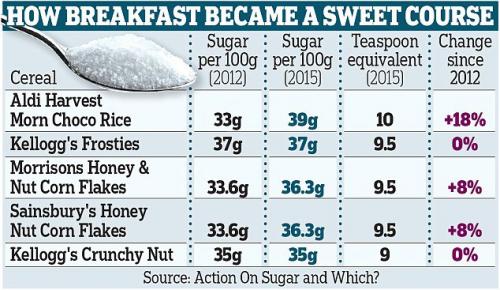-
Posts
14179 -
Joined
-
Last visited
-
Days Won
30
Content Type
Profiles
Forums
Events
Everything posted by dimreepr
-

Why sea ice can increase when the world warms up
dimreepr replied to swansont's topic in Climate Science
Greed is a powerful motivator. -
The WHO’s recommended daily sugar intake should be no more than 10% (ideally less than 5%) of added sugar. For a 2.000 calorie diet, 5% equals 25 grams, so a 100 gram serving of whatever that contains 17% sugar and is less than 20% of said diet should be ringing a few alarm bells. http://www.sugarscience.org/the-growing-concern-of-overconsumption/#.VdxA_flVhBc The AHA recommends 6 – 9 teaspoons of sugar per day...
-
Not to mention the heat of the engine.
-
It’s naive and a little arrogant to think your simplistic observation can make a valid contribution to a thread nearing its third page by reading the thread title. I to have noticed a cultural trend towards less sugar (the white stuff one spoons) in hot beverages but that doesn’t equate to our intake of sugar being reduced, since sugar has many different names and many different hiding places.
-
-
A little off topic but I think this new type of thermionic generator could be a more efficient way to go.
-

Movement of Ocean floor and Fingernail growth! Any connection?
dimreepr replied to Mike Smith Cosmos's topic in The Lounge
The moon is moving away from the earth at a rate of 3.78 cm/year, surely that’s to close to be a coincidence. -
Just out of curiosity have you read this thread rather than just the title? http://www.ncbi.nlm.nih.gov/pmc/articles/PMC4361030/ “There is more to food addiction than food restriction and bingeing. The type of nutrient that the animal ingests is also important. Our studies of food addiction have largely focused on sugar (sucrose or glucose). The positive results may relate to sugar as a special nutrient. It has its own receptor system in the tongue,51,52the intestines,53,54 the liver,55 pancreas,55 and brain.56 Glucoreceptors provide life-saving information to the ingestive behavior system and its associated learning, emotion, and motivational systems. In all probability, sugar addiction in rats is engendered by excessive, repeated activation of this pervasive sugar sensory system.” http://www.sciencedirect.com/science/article/pii/S0149763407000589 This review summarizes evidence of sugar dependence in an animal model. Four components of addiction are analyzed. “Bingeing,” “withdrawal,” “craving” and “cross-sensitization” are each given operational definitions and demonstrated behaviorally with sugar bingeing as the reinforcer. These behaviors are then related to neurochemical changes in the brain that also occur with addictive drugs. http://hereandnow.wbur.org/2015/01/07/sugar-health-research “When you look at animal studies comparing sugar to cocaine,” DiNicolantonio told Here & Now’s Lisa Mullins, “even when you get the rats hooked on IV cocaine, once you introduce sugar, almost all of them switch to the sugar.” But in the spirit of fair play here’s one that backs up your view http://www.sciencedirect.com/science/article/pii/S0261561409002398 Sorry Bill that was an American reference I apologise for not making that clear.
-

My theory that could find a cure for depression
dimreepr replied to MattMVS7's topic in General Philosophy
That’s twice now, you say you understand and then immediately demonstrate you don’t. You also seem to misunderstand the purpose of a discussion or the meaning of a theory, please read my signature. -
Evidence would help support that.
-
Given that tolerance is a basic tenant of almost all religions, it’s strange to see that the more fervently they adhere to religion the less tolerant they become.
-

My theory that could find a cure for depression
dimreepr replied to MattMVS7's topic in General Philosophy
Did you really mean to include mortality? Never the less you’ve set yourself an impossible target. Sad things happen (like the death of a loved one) and you will suffer the loss even if you recover quickly; not to mention the suffering from accidents or illness. You should read the link I gave on anhedonia, which is defined as “the inability to experience pleasure from activities usually found to be enjoyable” and is often the result of a mental disorder so your theory would need to treat such disorders as schizophrenia without antipsychotic medication. -

My theory that could find a cure for depression
dimreepr replied to MattMVS7's topic in General Philosophy
This is just nonsense. -

My theory that could find a cure for depression
dimreepr replied to MattMVS7's topic in General Philosophy
Not at all, what I’m saying is, it’s your choice; sometimes science can’t provide the answer, but so what. -

My theory that could find a cure for depression
dimreepr replied to MattMVS7's topic in General Philosophy
If you really understood then the underscored is answered. -

My theory that could find a cure for depression
dimreepr replied to MattMVS7's topic in General Philosophy
A blissful life depends on many things, Matt, such as: Not fearing/worrying about a future we can’t possibly know. Not dwelling on a past we can’t possibly change. Not jealously striving for that which we don’t need. Not trying to control others, when we can only request their cooperation. Not expecting but accepting. Not demanding our knowledge is paramount. And knowing the difference between contentment and happiness. -

My theory that could find a cure for depression
dimreepr replied to MattMVS7's topic in General Philosophy
Why, since strange has essentially answered your question? But to add, our choices not only include what we do about depression but also who we choose to blame for it; if we blame others then the expectation is, the cure lays outside of us and with others. In my experience and that of my friends (who say I’ve helped), acknowledging the ‘blame’ is within is a step on the path to recovery. -

My theory that could find a cure for depression
dimreepr replied to MattMVS7's topic in General Philosophy
I didn’t assert people choose to be depressed, my assertion, is that in a depressed state we have the choice and in this particular case the choice seems to be blaming others. -

My theory that could find a cure for depression
dimreepr replied to MattMVS7's topic in General Philosophy
So you blame the quote? Yet another excuse: try taking the path less trodden and blame yourself; because that is the reason for your apathy. -

My theory that could find a cure for depression
dimreepr replied to MattMVS7's topic in General Philosophy
Really? Please elaborate in simple terms, so I can understand. -
Or is it you're guilty of those things?
-

My theory that could find a cure for depression
dimreepr replied to MattMVS7's topic in General Philosophy
Is this a reason or an excuse? -

My theory that could find a cure for depression
dimreepr replied to MattMVS7's topic in General Philosophy
Good and bad isn’t relevant to anhedonia. In my experience we have a choice; be depressed and blame others, or determine your own path. It’s much easier to blame others and expect them to appease your passage. -

My theory that could find a cure for depression
dimreepr replied to MattMVS7's topic in General Philosophy
I have spent the majority of my life determined to be unhappy and even more determined to blame others for my misery, you seem to be taking a similar path. So can you please provide an abstract to your hypothesis as the above seems a little muddled. -

Important experiment request: Distant single photon
dimreepr replied to Theoretical's topic in Speculations
http://www.scienceforums.net



